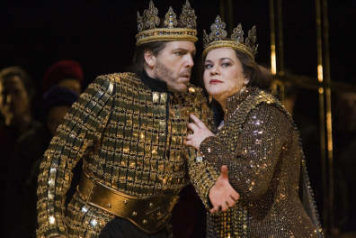|
Editor:
Marc Bridle
Webmaster: Len Mullenger
|
Seen and Heard Opera Review
Macbeth: Thomas Hampson (baritone) Banquo: John Relyea (bass-baritone) Lady Macbeth: Violeta Urmana (soprano) Lady-in-waiting: Elizabeth Woollett (soprano) Macduff: Joseph Calleja (tenor) Malcolm: Andrew Stritheran (tenor) * Doctor: Robert Gleadow (baritone) * * Jette Parker Young Artist
Director: Phyllida Lloyd Designs: Anthony Ward Lighting: Paule Constable Choreography: Michael Keegan Dolan Fight Director: Terry King
Quite why Macbeth does not command respect with the opera-going public to the degree of Verdi’s other Shakespearian operas is a little beyond me. It has a plot brimming with drama, a libretto that sticks (at Verdi’s insistence) close to the source for the most part, excellent solo arias and scenes, not to mention rousing ensembles for chorus too. True, the work is somewhat weakened in form and structure when performed in the later 1865 version but this is often the case these days. The reworkings show a more mature style at work and also serve to take the impact away from previously strong dramatic moments.
Phyllida Lloyd’s production leaves one in little doubt of the Macbeths’ strength with its stylised castle interior built of heavy stone blocks. But the fragility of the position that they bring upon themselves is clear too: everything the Macbeths do is a joint enterprise – to a greater or lesser extent – for richer or poorer. As the plot progresses, their personal relationship moves from murderous deeds borne in a chillingly bare bedroom, to the banquet where they appear very nouveau riche in gold attire within a raised gilded cage, and at the end in their separate beds each with their own madness to bear.
What I found hard to accept at first was the almost total lack of chemistry on stage between Thomas Hampson and Violeta Urmana, as Macbeth and his Lady. Until it hit me afresh, that is, that theirs is already a dead and loveless marriage at the start of the play/opera. What had first brought them together was his courage, and in his letter, Lady Macbeth savours the fact that some element of this still exists – however fleeting it may be. Hence the urgency needed of her command to “Be a man” when Macbeth cannot go through with Duncan’s murder. After such a crime, what options do the morally bankrupt pair have but to carry on? “Nuovo delitto…”, it’s not only necessary but easier too.
Vocally things were not particularly easy for either Hampson or Urmana. Hampson’s sotto voce tone was pleasing and his use of words carried meaning, but under pressure he declaimed with force but with little meaningful effect regarding the text. Urmana, whose voice is ever a variable instrument, showed some inconsistency from one line to the next, her pitching often approximate and with note values cut short. Of the three great dramatic moments that the role affords, her reading of the letter came off best and though the subsequent aria attracted acclaim it also attracted one loud boo. Given that her acting was so forthright, it was a pity that the voice – evil and ugly to complement the character as Verdi required – so often left one wanting more. The sleepwalking scene, which can and should bring down the house, barely got a ripple of applause – but then maybe on another night things might so easily be different.
By contrast, John Relyea’s Banquo was a tower of moral and vocal strength, acted with great confidence. Even without saying a word, his gestures spoke volumes about the character, and the eloquence of his singing merely confirmed it. Joseph Calleja’s Macduff was much in the same mould though acted less subtly: his one big aria was confidently given in ringing tones, to the delight of the audience. The smaller roles were also well assumed and acted, with the two Jette Parker Young Artists distinguishing themselves once again on the Covent Garden stage.
Yakov Kreizberg led a generally brisk account of the score, but it brought out the dramatic impetus in the orchestral writing to significant extent. Given that the chorus have such a prominent part to play however, it was perhaps a little disappointing that they seemed a touch uneven, confident in the male voices and less so in the females – which matters a good deal due to the importance of the witches. They writhed and made hurly- burly with the best of them, but vocally something was wanting. This, in a sense, sums up the evening.
Evan Dickerson
Picture © Clive Barda - Royal Opera House
Back to the Top Back to the Index Page |
| ||
|
||||



